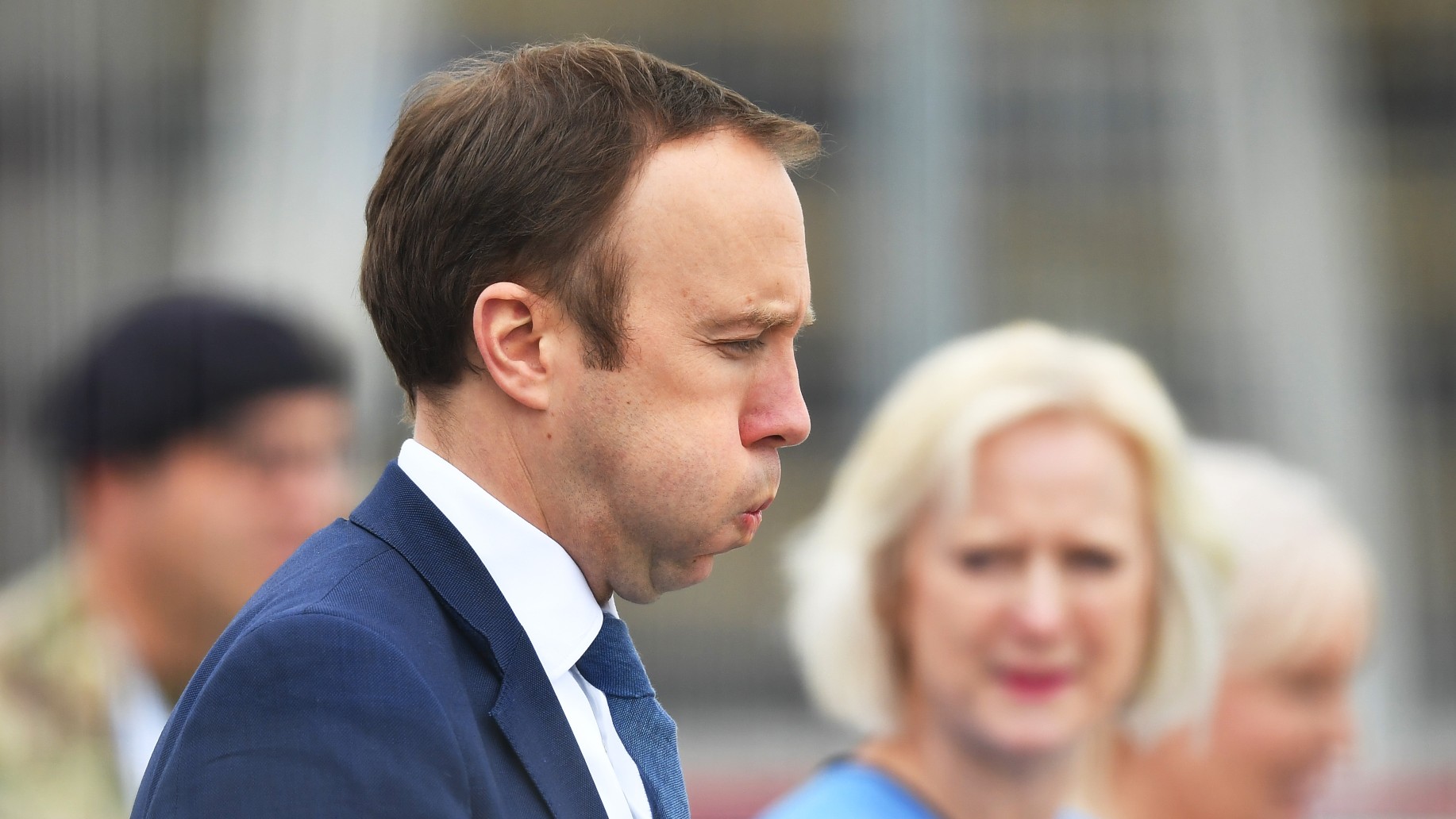Matt Hancock and the Lockdown Files: what’s happening with the Covid inquiry?
Leaked WhatsApps suggest former health secretary failed to follow advice to protect residents of English care homes

A free daily email with the biggest news stories of the day – and the best features from TheWeek.com
You are now subscribed
Your newsletter sign-up was successful
Matt Hancock allegedly did not follow advice from chief medical officer Professor Sir Chris Whitty to Covid-test all residents going into English care homes during the worst of the pandemic, according to a report based on thousands of leaked WhatsApp messages.
The Telegraph claims that Whitty had told Hancock in April 2020 that there should be testing for “all going into care homes and segregation whilst awaiting result” but the then health secretary instead chose to test only those being admitted to care homes from hospital, saying that testing everyone “muddies the waters”.
The revelation comes from a cache of 100,000 WhatsApp messages that were given to the newspaper by the co-author of his diaries, Isabel Oakeshott.
The Week
Escape your echo chamber. Get the facts behind the news, plus analysis from multiple perspectives.

Sign up for The Week's Free Newsletters
From our morning news briefing to a weekly Good News Newsletter, get the best of The Week delivered directly to your inbox.
From our morning news briefing to a weekly Good News Newsletter, get the best of The Week delivered directly to your inbox.
Hancock’s team were “pushing back hard” on the accusations, said Politico, immediately denying the claims and labelling them a “distorted account” that is “spun to fit an anti-lockdown agenda”. A spokesperson for Hancock said the former health secretary was “considering all options” in response to the leak.
What did the papers say?
SW1 chat groups were “set alight at 11 p.m. last night”, Politico said, when the Telegraph unveiled its Lockdown Files investigation.
In a 2,000-word op-ed explaining her reasoning for releasing the thousands of messages that underpin the Telegraph’s explosive investigation, Isabel Oakeshott argues that she was compelled to do so because the official Covid inquiry – to which Hancock claims to have submitted all this information – could take years to conclude.
“We may have to wait many years before [the inquiry] reaches any conclusions”, Oakeshott said. “That’s why I’ve decided to release this sensational cache of private communications – because we absolutely cannot wait any longer for answers.”
A free daily email with the biggest news stories of the day – and the best features from TheWeek.com
The main problem with the inquiry is that it is “mired in a secrecy row as lawyers busy themselves redacting civil servants’ names from thousands of documents”, she added. “By the time all those being paid vast sums of taxpayers’ money to protect reputations have finished, it is hard not to imagine the whole thing may become a colossal whitewash.”
The question of whether the government was right to not test everyone going into care homes is “a classic example of a seemingly simple claim that does not have a straightforward answer”, said the BBC health correspondent Nick Triggle. “The problem the UK faced was that there was not enough tests available”, so to test all those going into care homes any earlier “would have, it seems, meant tests not being made available for another key group”, said Triggle.
The allegation that Hancock failed to follow Whitty’s advice isn’t the only revelation of the Telegraph’s investigation, which also claims that officials couriered a Covid test to Jacob Rees-Mogg for one of his children while there was a shortage of testing kits, and that Hancock told the former chancellor George Osborne, then editor of the Evening Standard, “I WANT TO HIT MY TARGET!” as he tried to secure favourable front-page coverage.
What next?
Hancock’s spokesperson criticised the Telegraph investigation and threatened legal action in response to the leaks.
He added: “It is outrageous that this distorted account of the pandemic is being pushed with partial leaks, spun to fit an anti-lockdown agenda, which would have cost hundreds of thousands of lives if followed. What the messages do show is a lot of people working hard to save lives.”
Ian Dunt, the editor of Politics.co.uk, said on Twitter that Oakeshott’s decision to leak information to the Telegraph would do more harm than good.
“Oakeshott’s behaviour is so lacking in basic ethical standards that she makes it harder for any journalist to do their job and get sources to trust them,” Dunt said.
“The Telegraph is pursuing an anti-lockdown agenda. The stories we get will follow that agenda and we’ll not know what they omitted to make them fit.”
Dunt added that the right place for the story would have been “a playing-it-straight outlet or the inquiry. Hancock is a prize bellend, a national embarrassment, without the seriousness or basic ability necessary for the role he had. But this isn’t how to get him. And by signing up to it, we play into their hands.”
In a feature for UnHerd, however, Thomas Fazi and Toby Green, co-authors of The Covid Consensus, said Oakeshott’s concerns that the official Covid inquiry will move too slowly to give any satisfaction to the families of victims were legitimate.
“Do public inquiries ever deliver public satisfaction?” Fazi and Green asked. “Often, they provide more questions than answers. And rarely in a timely fashion. It took Chilcot seven years to produce his report into the Iraq war, after two previous whitewashes, and the Grenfell Tower inquiry took four-and-a-half years to produce little more than a ‘merry-go-round of buck-passing’ to the tune of £150 million in legal fees.”
As the Covid inquiry finally gets under way – two years after Boris Johnson said “we owe it to the country to produce answers in a reasonable timescale” – bereaved families and policy sceptics “could be forgiven for thinking the whole thing is an excuse to kick controversies and failings into the long grass”, Fazi and Green concluded.
Arion McNicoll is a freelance writer at The Week Digital and was previously the UK website’s editor. He has also held senior editorial roles at CNN, The Times and The Sunday Times. Along with his writing work, he co-hosts “Today in History with The Retrospectors”, Rethink Audio’s flagship daily podcast, and is a regular panellist (and occasional stand-in host) on “The Week Unwrapped”. He is also a judge for The Publisher Podcast Awards.
-
 Switzerland could vote to cap its population
Switzerland could vote to cap its populationUnder the Radar Swiss People’s Party proposes referendum on radical anti-immigration measure to limit residents to 10 million
-
 Political cartoons for February 15
Political cartoons for February 15Cartoons Sunday's political cartoons include political ventriloquism, Europe in the middle, and more
-
 The broken water companies failing England and Wales
The broken water companies failing England and WalesExplainer With rising bills, deteriorating river health and a lack of investment, regulators face an uphill battle to stabilise the industry
-
 How are Democrats turning DOJ lemons into partisan lemonade?
How are Democrats turning DOJ lemons into partisan lemonade?TODAY’S BIG QUESTION As the Trump administration continues to try — and fail — at indicting its political enemies, Democratic lawmakers have begun seizing the moment for themselves
-
 How did ‘wine moms’ become the face of anti-ICE protests?
How did ‘wine moms’ become the face of anti-ICE protests?Today’s Big Question Women lead the resistance to Trump’s deportations
-
 How are Democrats trying to reform ICE?
How are Democrats trying to reform ICE?Today’s Big Question Democratic leadership has put forth several demands for the agency
-
 Why is Tulsi Gabbard trying to relitigate the 2020 election now?
Why is Tulsi Gabbard trying to relitigate the 2020 election now?Today's Big Question Trump has never conceded his loss that year
-
 Will Democrats impeach Kristi Noem?
Will Democrats impeach Kristi Noem?Today’s Big Question Centrists, lefty activists also debate abolishing ICE
-
 Do oil companies really want to invest in Venezuela?
Do oil companies really want to invest in Venezuela?Today’s Big Question Trump claims control over crude reserves, but challenges loom
-
 What is China doing in Latin America?
What is China doing in Latin America?Today’s Big Question Beijing offers itself as an alternative to US dominance
-
 Why is Trump killing off clean energy?
Why is Trump killing off clean energy?Today's Big Question The president halts offshore wind farm construction